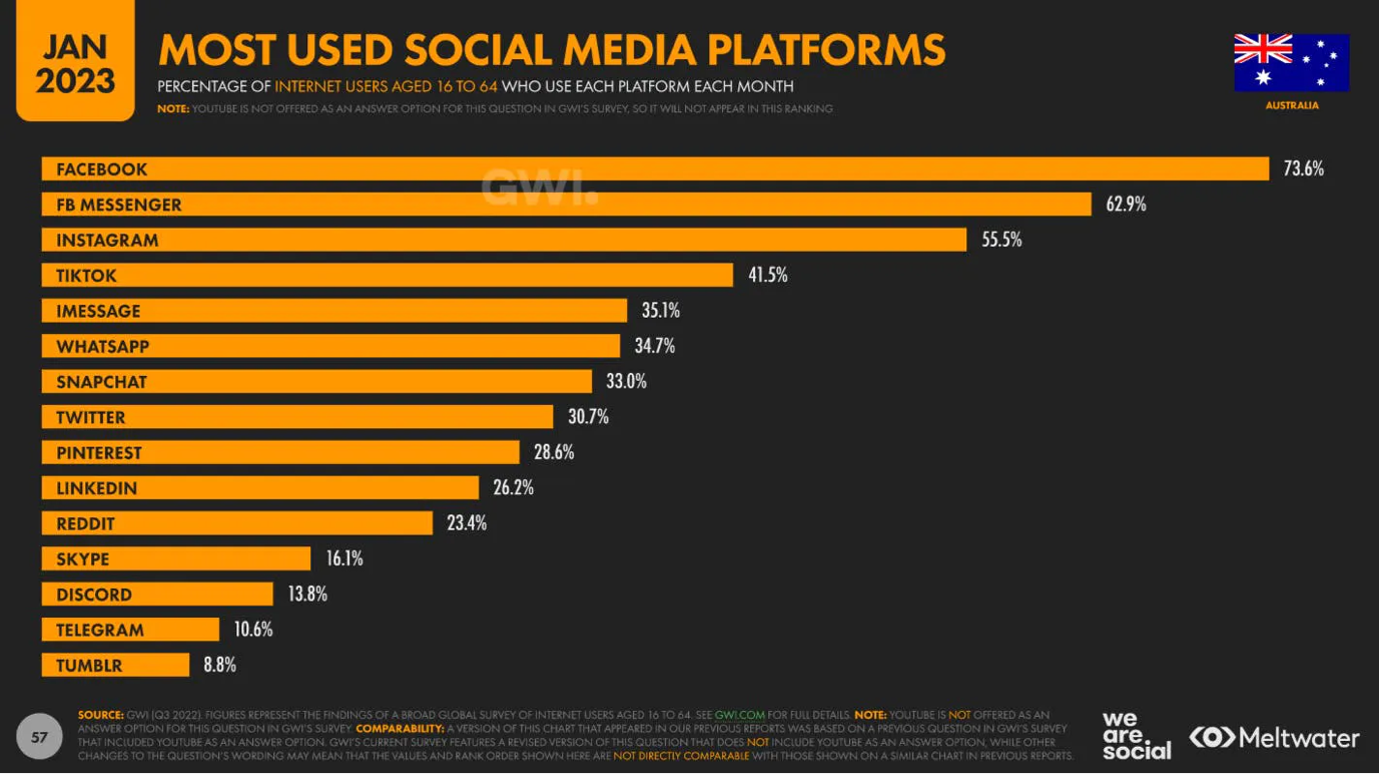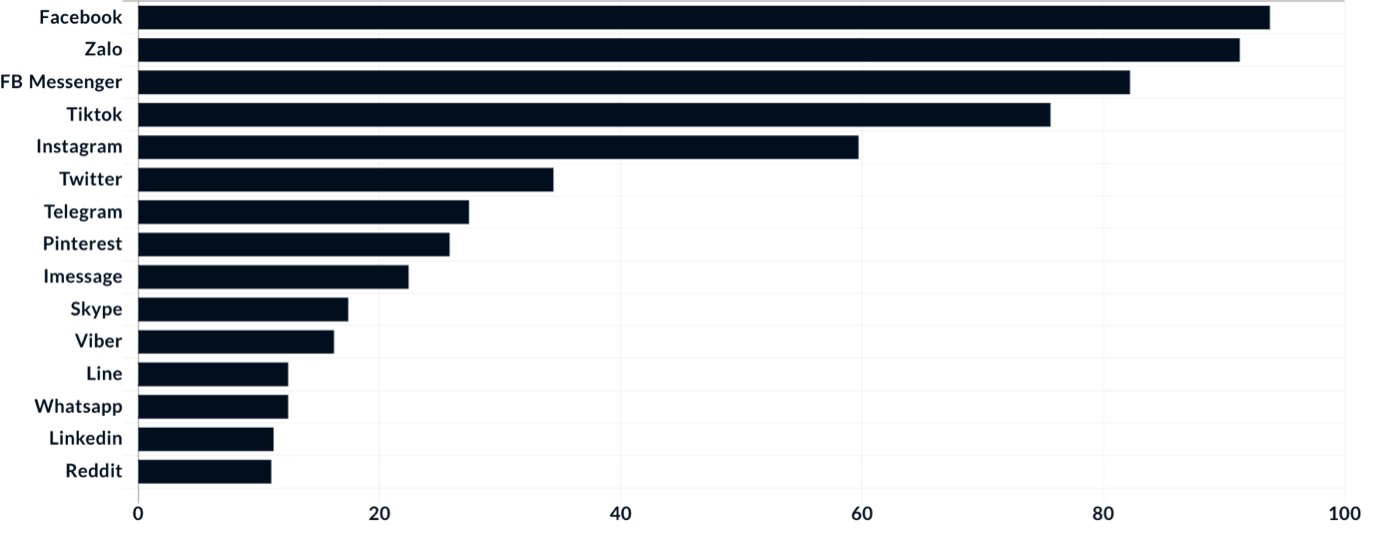2023 Media Study Tour: Vietnam - Assignment One
Assignment One: Pre-departure research
Vietnam has experienced substantial growth in internet connectivity and smartphone usage over the past decade, with the development being accompanied by the increase adoption and influence of social media platforms among the population. Vietnam, a rapidly developing country with an ever-growing population of almost 100 million, has had an escalation in internet penetration and smartphone usage, resulting in the adoption and usage of social media platforms. This report will explore the different social media platforms used within Vietnam, and how they play a role within the Vietnamese society, the impact on businesses, and challenges and opportunities associated with its usage.
One of the many factors that has pushed this growth and penetration of social media, is the more readily available and affordable smartphones and improved connectivity, with the smartphone market in Vietnam to reach $7.54 billion USD by 2027 due to the increased use (Consumer Goods and Retail 2023). With Vietnam’s adoption of technologies and the digitalisation of media has had an influential impact in the way that individuals communicate whether through messaging and social media to how news and media is shared, this is despite Vietnam is a country where media is not considered to be free and independent (Azmawati, AA & Khan, RE 2016). Vietnam’s social media landscape is dominated by platforms such as Facebook, YouTube, Zalo, TikTok, and Facebook Messenger. Facebook remains the most widely used social media platform in the country with ‘approximately 94% of Vietnamese internet users using Facebook’ (Nguyen, M-N 2022). While Facebook is the dominant media platform, Vietnam is home to having their own unique platform Zalo. Zalo is the second most dominant social media platform in the country, with almost 100 million users, it is the preferred messaging platform amongst the citizens of Vietnam due to the privacy and security that it provides to their users (Evans, M 2023).
(Guzman, J de 2023)
Unlike Vietnam, Australia has very few regulations in terms of social media and has somewhat struggled to regulate social media in comparison, but with this said there are some regulations that the Australian government have put in place. These include, Australian Consumer Law (Australian Competition and Consumer Commission, 2023), Online Safety Act 2021 (Australian Government 2021a), and the Social Media (Anti-Trolling) Bill (Australian Government 2021b). The social media (Basic Exception and Defamation) Bill 2021 was another bill introduced to parliament with the purpose of allowing the minster to set basic expectations of social media service providers but seems that this bill will not be proceeding (Parliament of Australia 2021).
Social media in Vietnam is rapidly evolving and has become an integral part of individuals lives, social media in Vietnam has transforms the way that individuals connected, share information, and conduct business. With the popularity of platforms such as Facebook, Zalo, YouTube, and TikTok reflects the significant role that social media plays within Vietnamese society. Whole the positive impacts of social media are prevalent, there is still the challenges that faced, such as misinformation, ‘Fake News’, and privacy concerns, which still require the continuous efforts in striking a balance between freedom of expression and responsible usage. As Vietnam grows and progresses, social media will continue to evolve, shaping the country’s digital landscape.
Most Used Platforms (% of Internet Users) Note: 2022
(Consumer Research 2023)
While social media presents numerous opportunities for individuals, it also does so for Vietnamese businesses. Social media has also had impact on the ways business operate and engage with customers within Vietnam. These include, ‘new sources of information, brand communication outlets, and advertising platforms’ (Nguyen, M-N 2022). As discussed, Facebook is the most prevalent social media platform in Vietnam, this has led the platform in becoming very popular amongst the ecommerce space in Vietnam, with 31% of Hanoi residents choosing Facebook to be their first choice of ecommerce services (Olivier 2022).
With this comes various regulations that the Vietnamese government have put in place, including guidelines on content censorship, user data protection, and platform responsibilities. In one case, as of September 2022 the Vietnamese government introduced ruling that controls which type of accounts are allowed to disseminate news in the country (Liao, R 2022). This can be construed as a positive as it may stop the spread of false and misleading information to the wider audience, in such, less “Fake News”, but this ruling also has right for concern as it risks the loss of internet freedom, in which the Vietnamese government has already heavily governed the internet (Liao, R 2022). Other than regulatory and censorship issues within Vietnam, digital divide and unequal access is still very much present within the country, while social media and internet usage may be growing, there are still disparities in access between urban and rural areas, as well as socioeconomic disparities. This has been demonstrated in a study conducted by Doanh-Ngan-Mac Do, Trung Tran, and Le-Thanh Thi Tran, featuring two universities, they strived to determine the level of digital divide in the mountains of Vietnam, finding that “most of those who have difficulty accessing the internet are in poor, remote, and isolated areas.” (Favorskaya, MN, Peng, S-L, Simic, M, Alhadidi, B & Pal, S 2021)
Vietnam’s use of social media exhibits notable differences to Australian usage, this is mainly due to strong variations in cultural norms, and platforms preferences. For example, within Australia platforms such as Facebook, Instagram, Twitter, TikTok, Facebook Messenger, and Snapchat are used for various purposes such as social networking, content sharing, and online commerce. Similar to Vietnam, in Australia Facebook still remains the most subscribed platform for millennials and older generations, while younger generations find Facebook less relevant (Statista Research Department 2022).


